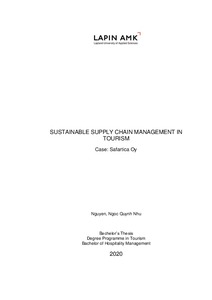Sustainable Supply Chain Management in Tourism
Nguyen, Nhu (2020)
Nguyen, Nhu
2020
All rights reserved. This publication is copyrighted. You may download, display and print it for Your own personal use. Commercial use is prohibited.
Julkaisun pysyvä osoite on
https://urn.fi/URN:NBN:fi:amk-2020052212876
https://urn.fi/URN:NBN:fi:amk-2020052212876
Tiivistelmä
Sustainable supply chain management (SSCM) has been increasingly adopted by organizations within different industries, including tourism, as an approach to gain sustainable development goals. The integration of sustainability into tourism supply chain management (TSCM) facilitates the sustainable tourism development at a destination owing to the potentiality to mitigate the negative social and environmental impacts. These impacts derive from business operations of entities included in the tourism supply chain (TSC) in which Destination Management Companies (DMCs) play an instrumental role in promoting sustainability along the chain. In this research, the case of analysis was Safartica – the second leading DMC in Lapland, Finland.
The aim of the thesis is to assess the current SSCM situation at the DMC Safartica and then propose practices to improve the company’s SSCM. The research is based on the theoretical framework focusing on sustainable development, TSC, and SSCM in tourism. A qualitative approach was adopted along with several methods consisting of theme interviews and content analysis. Five semi-structured interviews were conducted to gather data and analysis directed by the conceptual framework was performed using the content analysis method.
Results revealed that Safartica is aware of the significance of including sustainability in supply chain management (SCM) from the viewpoint of a leading DMC to support sustainable tourism development in the destination. Several sustainable SCM actions have been implemented by the company. However, the lack of training and guidelines pertaining to SSCM is visible. There exists no systematic approach fostering the incorporation of sustainability in SCM to advance tourism sustainability. The recommendations based on the literature would enable the DMC to identify areas of SSCM where improvements are required. Precisely, Safartica is suggested to adopt and implement multiple practices in the following areas: engaging business in sustainability, creating an SSCM policy and code of conduct, promoting suppliers’ baseline sustainability assessment, developing an SSCM plan to prioritize actions, and monitoring and evaluating performance.
The aim of the thesis is to assess the current SSCM situation at the DMC Safartica and then propose practices to improve the company’s SSCM. The research is based on the theoretical framework focusing on sustainable development, TSC, and SSCM in tourism. A qualitative approach was adopted along with several methods consisting of theme interviews and content analysis. Five semi-structured interviews were conducted to gather data and analysis directed by the conceptual framework was performed using the content analysis method.
Results revealed that Safartica is aware of the significance of including sustainability in supply chain management (SCM) from the viewpoint of a leading DMC to support sustainable tourism development in the destination. Several sustainable SCM actions have been implemented by the company. However, the lack of training and guidelines pertaining to SSCM is visible. There exists no systematic approach fostering the incorporation of sustainability in SCM to advance tourism sustainability. The recommendations based on the literature would enable the DMC to identify areas of SSCM where improvements are required. Precisely, Safartica is suggested to adopt and implement multiple practices in the following areas: engaging business in sustainability, creating an SSCM policy and code of conduct, promoting suppliers’ baseline sustainability assessment, developing an SSCM plan to prioritize actions, and monitoring and evaluating performance.
